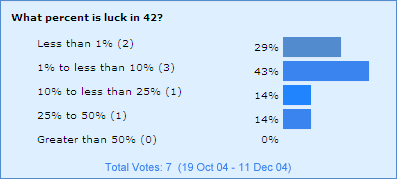
Extract (summary) from rationales for lower estimates:
... the luck factor is less than 1%, and almost all of that is in the drawing of dominos. If one percent of drawn hands were unbeatable, that would mean over 11,840 different possible sure-win combinations could be drawn. That seems like too many. After drawing their dominos, how skillfully the players bid and play their dominos is not luck. Playing the odds and capitalizing on opponents' faulty strategy is skill. And even the most skillful players sometimes lose because they draw a disproportionate number of "sucky" hands.
Extracts from rationales for higher estimates:
40% estimate:
... it seems to me that one can consider it in the following way. From the total number of hands possible, there will be absolute winners, as you point out, (no skill involved) there will be absolute losers (no skill involved) and there will be in-between hands, that is, winning hands if bid and played by a skilled player but losing if bid and played by an unskilled player. (I guess this does not say anything about the level of skill required just whether one is skilled or not. I suppose the more hands one is able to win in this set the higher the skill level.) Soooo the question is, how many of these intermediate hands are there in the universe of possibilities. My guess is at least 50%. I also guess that at least 30% of the hands are losers no matter who gets them. So that would say that 50% to 70% of the winning hands are based on skill. Since the in-between number is 60%, I guess that 60% of winning is due to skill and the remainder is due to luck. So, my guess is 40% is due to luck.
Less than/equal 10% to greater than/equal 50%:
... there are two elements of luck here: one is simply in drawing the dominoes at the beginning of the hand, and the other is how the other players play. But I don't know how either one can be quantified.
In the latter case, you could be lucky that an opponent misplayed in a situation where he could have set you. Even good players can make a mistake in that instance occasionally, but other times a player has a 50/50 choice as to how to play on a particular trick and there is no real 'mistake' in the choice - he just guessed wrong. This is particularly true in 84 hands, where I may have to choose between what to save for to set the bidder. If I guess wrong, then the bidder is lucky that I did so, because I had the dominoes in my hand to set him. I don't know how you can quantify that statistically.
In the first case, the 'luck of the draw' is in the seven dominoes the players start out with ... But that only quantifies the static dominoes before even one trick is played. The luck stops right there. Those odds don't account for a player assessing his bid opportunities, bidding appropriately, winning the bid over all other bidders, and then making the correct plays throughout the hand, all the time reacting to the plays made on each trick by the other three players.
Obviously skilled players rely less on luck as a whole. Another way of saying that would be that the reason someone is a skilled player is because they know the probabilities of how the dominoes should be split out among the four players, and are also able to read other players' hands by watching what they play each trick. They see bidding opportunities in a hand that lesser players miss. They learn what they need to play next by accurately assessing where certain dominoes may be in other players' hands. Etc. They know what's risky - or against the odds - and what is not. Lesser players miss these things, and therefore need more "luck" in order to win. Having said this, I would also point out that there are skilled players who choose to rely more on luck, through their bidding philosophies. In other words, they decide to overbid their hands just to get the bid, and then hope they get lucky through their partner's hand or through the opponents misplays. If they do get lucky, they look great. If not, they go down in flames.
... I would say skilled players who play close to the odds as I have described above reduce the element of luck to 10% or less. Unskilled players, or skilled players who choose to bid wildly, can increase the amount of luck involved in a particular match to 50% or more.
